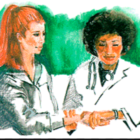Healthy Living
For Those in Recovery Over the Holidays, Hotline and Online Support Groups Offered by Mountainside Treatment Center
|
Thanksgiving is traditionally a time for reconnecting with loved ones over food and drinks, but for those in active addiction or recovery, it can present unhealthy temptations and added stress. With the Thanksgiving break quickly approaching, Mountainside treatment center in Wilton will provide a free helpline and “virtual” recovery support groups online for those in need of assistance for themselves or their loved ones this holiday season. — an announcement from Mountainside Treatment Center
For people in recovery, the cold weather and shorter days of winter can lead to boredom and isolation, increasing their risk of relapse. Additionally, binge drinking over the Thanksgiving weekend has become increasingly popular, with Thanksgiving Eve even being nicknamed “Blackout Wednesday” or “Drinksgiving” as many Americans pack local bars to celebrate the long weekend. With this in mind, Mountainside’s 24/7 Holiday Helpline will be available from Nov.





